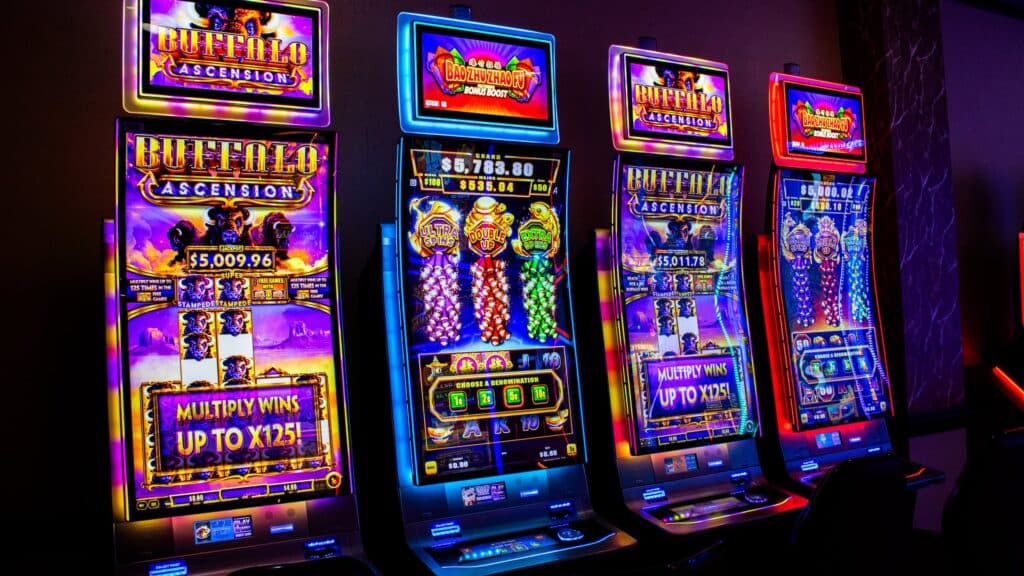Mastering your session length at slot machines is essential for gamblers seeking to blend the thrill of play with responsible habits, ensuring gambling remains an enjoyable pastime and not a time-consuming diversion from daily life.
The Illusion of Time: How Slots Distort Perception
Slot machines are expertly designed to immerse players in a captivating experience, utilizing a combination of sensory stimuli and psychological rewards that can significantly alter one's perception of time, making even experienced gamblers susceptible to losing track of their intended session duration. This distortion is not accidental but a deliberate aspect of casino design, aimed at maximizing player engagement and time-on-device, which directly correlates with increased revenue for the gambling industry. Understanding the mechanisms behind this time distortion is the first step for any gambler to effectively manage their time while playing slots and maintain control over their gambling habits.
Sensory Immersion and Cognitive Absorption
The allure of slot machines begins with their sensory appeal. Bright, flashing lights, vibrant animations, and engaging sound effects create an environment that is both stimulating and absorbing. These elements are carefully orchestrated to capture attention and draw players into the game's immediate experience, effectively minimizing awareness of the outside world and the passage of time. The cognitive absorption required to follow the game's pace, anticipate outcomes, and react to near-wins further deepens this immersion, narrowing focus and reducing the mental resources available for time-tracking.
The Role of Intermittent Reinforcement
Slot machines operate on a principle of intermittent reinforcement, a psychological concept where rewards are dispensed unpredictably. This variable reward schedule is exceptionally effective at maintaining engagement because of the anticipation it creates; players know that a win is possible, but they never know exactly when it will occur. This uncertainty leads to persistent play as gamblers chase the next potential payout, with each spin holding the promise of a reward, thus further contributing to time distortion as players become engrossed in the pursuit of wins.
Casino Environment: Designed for Timelessness
Casinos are intentionally designed to minimize temporal awareness. The absence of windows and clocks is a deliberate strategy to remove natural time cues. Consistent artificial lighting maintains a perpetual sense of daytime, regardless of the actual time, and the constant hum of activity and background music further masks the natural rhythms of day and night. This environment of timelessness encourages gamblers to detach from their normal schedules and routines, making it easier to lose track of time spent playing slots.
Emotional and Psychological Engagement
The emotional rollercoaster of slot play—the highs of small wins, the lows of losses, and the suspense of near-misses—contributes significantly to time distortion. These emotional fluctuations heighten focus on the game and reduce awareness of external factors, including time. The psychological engagement is intensified by the personal investment in each spin, both financially and emotionally, making it harder for players to step away, even when they intend to.
Establishing Concrete Time Boundaries for Slot Sessions
Setting firm time boundaries before initiating a slot machine session is a cornerstone of responsible gambling, providing a proactive defense against the time-distorting effects inherent in slot play and casino environments, crucial for both new and seasoned gamblers alike. These boundaries act as pre-set limits that help maintain control and prevent unintended extended play, regardless of the immediate outcomes or the immersive nature of the game.
Defining Session Limits: Duration and Frequency
Before starting to play, clearly define the duration of your slot session. Decide how many minutes or hours you are willing to dedicate to playing slots in a single session. Consider also the frequency of your play; how often per day, week, or month will you engage in slot gambling? These parameters should be based on your lifestyle, commitments, and financial boundaries, ensuring gambling remains a contained activity.
Integrating Time Limits with Financial Budgets
Effective time management in slots is intrinsically linked to financial management. Always integrate your time limits with pre-set financial budgets. Determine the maximum amount of money you are prepared to spend in your defined time session. This dual-limit approach ensures that neither time nor money is excessively spent. For instance, you might set a limit of one hour of play or $50, whichever comes first, reinforcing disciplined gambling behavior.
Utilizing Technology to Enforce Limits
Leverage technology to help enforce your time limits. Set alarms on your smartphone, smartwatch, or use casino-provided timing tools if available. Many smartphones offer customizable timers and alarms that can be set discreetly. Some gambling apps also include built-in features that allow you to set session reminders or time-out alerts. These technological aids serve as external enforcers of your pre-determined limits, providing clear signals to stop play.
Pre-Commitment and Session Planning
Treat your slot gambling sessions as planned activities within your day or week. Schedule them in, much like appointments or recreational activities. This pre-commitment involves consciously deciding when and for how long you will play, rather than engaging impulsively. Planning ahead helps to solidify your intentions and makes it easier to adhere to your set time limits when the actual gambling session begins.
Regularly Review and Adjust Limits
Periodically review the effectiveness of your time and budget limits. Are they realistically aligned with your gambling habits and lifestyle? Adjust your limits as needed based on your experiences and self-assessment. If you consistently find it challenging to stick to your limits, it may be necessary to reduce them further or seek additional strategies for managing your gambling behavior.
Harnessing Environmental and Personal Time Signals in Casinos
Within the intentionally timeless environment of a casino, subtle cues and personal strategies can be employed to maintain a sense of time and manage slot play effectively, even for those deeply engaged in gambling activities. Recognizing these signals and integrating them into your gambling routine can counteract the casino's design and help you stay aware of your session duration.
Leveraging Casino Operational Rhythms
Casinos operate on certain rhythms, even if they are not immediately obvious. Staff rotations, scheduled events, and changes in ambient noise levels can serve as time markers. Observe when dealers or slot attendants change shifts, or listen for announcements over the public address system, which often occur at regular intervals. These operational changes can provide approximate time checks, helping you gauge how long you've been playing.
Using Natural Light and External Views (Where Available)
While casinos typically minimize natural light, some areas, particularly near entrances or in adjacent spaces, may offer glimpses of the outside world. If possible, position yourself or take breaks in locations where you can occasionally see natural light or external views. Noticing changes in daylight can provide a rough sense of time progression. Even a brief walk to an area with windows can help reset your internal clock and provide a temporal reference point.
Personal Biological Cues: Hunger and Fatigue
Pay attention to your body's natural signals of hunger, thirst, and fatigue. These biological cues are reliable indicators of time passage, even in a casino environment designed to mask them. If you start feeling hungry or tired, it's likely been a significant amount of time since you began playing. Use these feelings as prompts to check the actual time and consider ending your session.
Social Cues from Fellow Gamblers
Observe the behavior of other gamblers around you. Notice when people arrive, take breaks, or leave. These social cues can provide a relative sense of time. If you see familiar faces leaving or new groups arriving, it suggests that time is passing, and your session might be longer than you realize. Using these observations can help contextualize your own gambling duration within the broader casino environment.
Integrating Personal Routines into Gambling Sessions
Incorporate personal routines into your slot play to create time boundaries. For example, decide to take a break after every drink, or after using a set amount of cash. These routines act as personal time markers, breaking up the gambling session into segments and making it easier to track overall time spent. By linking your play to these routines, you create a structured approach to time management within the potentially disorienting casino setting.
Active Techniques for Maintaining Time Awareness During Slot Play
To effectively counteract time distortion while playing slot machines, active and conscious techniques are necessary, transforming passive play into a more controlled and aware experience, crucial for responsible gambling for all player types. These techniques involve integrating regular actions and mental checkpoints directly into your gambling session to maintain temporal awareness.
Implementing Regular Time Audits
Conduct regular "time audits" throughout your slot session. Set a mental or device-based reminder to check the time at fixed intervals, such as every 15 to 20 minutes. During these audits, consciously note how long you've been playing and reassess whether you are still within your planned time limits. This practice of periodic checking helps to counteract the immersive nature of slot machines and brings a sense of reality back into your gambling experience.
Using a Countdown Timer
Employ a countdown timer set to your predetermined session length. Start the timer as you begin playing slots. The timer visually and audibly counts down your remaining play time, providing a constant, direct reminder of your time limit. When the timer reaches zero, it serves as an unambiguous signal to stop playing, regardless of your current game outcomes.
Spin-Based Time Tracking
Track your time based on the number of spins rather than relying solely on clock time. Decide on a maximum number of spins you will play in a session. For example, set a limit of 100 or 200 spins. Count your spins as you play, either mentally or using a simple tracking app. This method links your time directly to your gambling activity, providing a tangible measure of play duration that is less susceptible to casino-induced time distortion.
Setting "Time-To-Stop" Alarms
Set a "time-to-stop" alarm on your phone or watch, programmed to go off a few minutes before your intended session end time. This alarm serves as a preparatory warning, giving you a few minutes to conclude your current game, cash out, and prepare to leave. It acts as a proactive measure, preventing you from abruptly exceeding your time limit in the heat of the moment.
Integrating Breaks with Time Checks
Combine scheduled breaks with time checks. Plan to take a short break every 30 to 45 minutes of play. During each break, consciously check the time, reassess your session duration, and decide whether to continue or conclude your play. These breaks not only help manage time but also provide mental and physical respite, reducing impulsivity and promoting clearer decision-making.
Verbal Time Commitments
If gambling with a companion, make verbal time commitments to each other. Agree on session limits and periodically remind each other to check the time and adhere to these limits. Verbal commitments enhance accountability and can strengthen resolve to manage time effectively, as you are mutually supporting responsible gambling habits.
Integrating Slot Play into a Balanced Lifestyle Framework
To ensure that playing slot machines remains a healthy and sustainable form of entertainment, it is crucial to integrate it thoughtfully into a balanced lifestyle, preventing it from overshadowing other important life domains, a key consideration for all gamblers. This integration involves consciously managing time allocation across various activities, ensuring gambling enhances rather than detracts from overall well-being.
Prioritizing Life's Core Responsibilities
Always prioritize core responsibilities over gambling. Work, family commitments, health appointments, and personal obligations should take precedence. Ensure that time spent playing slots does not infringe upon these essential areas of life. Gambling should be scheduled only after all responsibilities are adequately addressed. This prioritization helps maintain life balance and prevents gambling from becoming a disruptive force.
Designating Specific Gambling-Free Days
Establish "gambling-free days" throughout the week. These are days entirely dedicated to non-gambling activities, ensuring regular breaks from gambling. Having designated days off from gambling helps to reset your routine, reduce the psychological pull of slot machines, and allows you to engage more fully in other interests and responsibilities. These breaks are crucial for maintaining a balanced perspective and preventing gambling from becoming an everyday focus.
Allocating Time for Hobbies and Interests
Actively cultivate and dedicate time to hobbies and interests unrelated to gambling. Sports, arts, reading, social clubs, and outdoor activities provide alternative sources of enjoyment and fulfillment. Engaging in a variety of hobbies enriches life experience and reduces reliance on gambling for entertainment or emotional satisfaction. A diverse range of interests naturally limits the time and importance attributed to gambling in your overall lifestyle.
Balancing Social and Solitary Activities
Ensure a balance between social interactions and solitary activities, with gambling ideally being a minor component of either. Spend quality time with family and friends, participate in community events, and maintain social connections. These interactions provide social support and shared experiences that gambling cannot replace. Balancing social and solitary time helps prevent gambling from becoming an isolating activity and reinforces a healthy social life.
Promoting Physical and Mental Well-being
Invest time in activities that promote physical and mental health. Regular exercise, healthy eating, mindfulness practices, and sufficient sleep are essential for overall well-being. A healthy lifestyle enhances self-control, improves mood, and reduces stress, all of which are beneficial for responsible gambling and effective time management. Prioritizing well-being creates a strong foundation for making balanced choices in all areas of life, including gambling.
Regular Lifestyle Review and Adjustment
Conduct regular reviews of your lifestyle balance. Assess how gambling fits into your overall week and month, and whether it is contributing positively or negatively to your life. Be prepared to make adjustments as needed. If gambling is taking up too much time or negatively impacting other areas, proactively reduce your gambling frequency or duration to restore balance. Continuous self-assessment and adjustment are key to maintaining a healthy and sustainable lifestyle that includes controlled slot play.
Seeking External Resources for Slot Time Management Challenges
For individuals who find it challenging to manage their time effectively while playing slots, or for those concerned that their gambling habits are becoming problematic, numerous external resources are available to provide support and guidance, crucial for fostering responsible gambling practices. These resources range from professional counseling services to community support groups and online tools, all aimed at helping gamblers regain control and manage their gambling time and behavior.
Accessing Professional Gambling Counseling Services
Consider seeking professional counseling from therapists or counselors specializing in gambling addiction. These professionals offer evidence-based therapies such as Cognitive Behavioral Therapy (CBT) and Motivational Interviewing (MI). CBT helps individuals identify and change negative gambling behaviors and thought patterns, while MI enhances motivation to change. Professional counseling provides personalized strategies and support tailored to individual needs and circumstances.
Joining Gamblers Anonymous (GA) and Peer Support Groups
Engage with peer support groups like Gamblers Anonymous (GA). GA and similar organizations offer a community-based approach to overcoming gambling problems. Meetings provide a safe and confidential environment to share experiences, gain support from peers, and learn from others who have successfully managed their gambling habits. Peer support groups offer encouragement, practical advice, and a sense of belonging, which can be invaluable in managing gambling time and behavior.
Utilizing Online Responsible Gambling Platforms
Explore online platforms and resources dedicated to responsible gambling. Many websites offer tools, information, and support forums designed to help individuals gamble safely. These platforms may provide self-assessment quizzes, budgeting tools, time trackers, and access to online counseling or support groups. Online resources offer convenient and accessible support for managing gambling habits and time effectively.
Contacting Gambling Helplines and Hotlines
Utilize gambling helplines and hotlines for immediate support and advice. Many regions offer telephone or online chat services staffed by trained counselors. These helplines provide confidential, immediate assistance, offering guidance on managing gambling urges, finding local support services, and dealing with gambling-related crises. Helplines are a crucial first point of contact for anyone seeking urgent help with their gambling behavior.
Employing Self-Exclusion Programs
Consider enrolling in self-exclusion programs offered by casinos and gambling regulatory bodies. These programs allow individuals to voluntarily ban themselves from gambling venues. Self-exclusion provides a strong barrier against impulsive gambling and can be particularly effective for those struggling to control their time and spending at slot machines. This measure offers a structured and legally binding commitment to abstain from gambling.
Seeking Financial and Debt Management Advice
If gambling has led to financial difficulties, seek advice from financial counselors or debt management services. These professionals can help you develop strategies to manage gambling-related debt and regain financial control. Financial counseling addresses the practical consequences of excessive gambling and provides tools and plans to restore financial stability. Addressing financial issues is an integral part of managing the broader impacts of problem gambling.
Concluding Thoughts: Time Mastery as Key to Enjoyable Slot Gambling
In conclusion, effective time management is not merely a strategy but a cornerstone of responsible and enjoyable slot machine gambling, vital for ensuring that the allure of slots enhances leisure time rather than eroding personal well-being for both novice and experienced players. By understanding the subtle yet powerful ways in which slot machines and casino environments can distort time perception, gamblers can proactively implement strategies to maintain control over their session durations. Establishing clear time boundaries, recognizing and responding to time cues, and actively employing time-awareness techniques are essential steps in this process. Integrating slot play into a balanced lifestyle, where gambling is just one of many valued activities, further reinforces healthy habits.
For those who struggle with time management in gambling, numerous support resources are readily available, offering professional and community-based assistance to regain control and foster responsible gambling practices. Ultimately, mastering time while playing slots is about intentionality and balance, ensuring that the excitement of the game is enjoyed within safe and sustainable limits, preserving both the fun of gambling and the integrity of daily life. Embracing these principles allows gamblers to approach slot machines with confidence and awareness, transforming a potentially risky pastime into a controlled and enriching form of entertainment.
External Resources:



